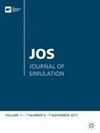An agent-based model to assess citizens’ acceptance of COVID-19 restrictions
IF 1.7
4区 工程技术
Q4 COMPUTER SCIENCE, INTERDISCIPLINARY APPLICATIONS
引用次数: 4
Abstract
ABSTRACT Italy was the first European state affected by COVID-19. Despite many uncertainties, citizens chose to trust the authorities and their trust was pivotal. This research aims to investigate the contribution of Italian citizens’ trust in Public Institutions and how it influenced the acceptance of the necessary counter measures. Applying linear regression to a dataset of 4260 Italian respondents, we modelled trust from its main cognitive components, with particular reference to competence and willingness. Therefore, exploiting agent-based modelling, we investigated how these components affected trust and how trust evolution influences the acceptance of these restrictive measures. Our analysis confirms the key role of competence and willingness as cognitive components of trust. Results also suggest that a generic attempt to raise the average trust, besides being challenging, may not be the best strategy to increase compliance. Furthermore, reasoning at category level is a fundamental to identify the best components on which to invest.评估公民对新冠肺炎限制措施接受程度的基于代理的模型
摘要意大利是第一个受新冠肺炎影响的欧洲国家。尽管存在许多不确定性,公民还是选择信任当局,他们的信任至关重要。本研究旨在调查意大利公民对公共机构的信任的贡献,以及它如何影响对必要反措施的接受。将线性回归应用于4260名意大利受访者的数据集,我们从信任的主要认知成分,特别是能力和意愿,对信任进行了建模。因此,利用基于代理的建模,我们研究了这些组成部分如何影响信任,以及信任进化如何影响对这些限制措施的接受。我们的分析证实了能力和意愿作为信任的认知组成部分的关键作用。研究结果还表明,提高平均信任度的一般尝试除了具有挑战性外,可能不是提高合规性的最佳策略。此外,类别层面的推理是确定投资的最佳组成部分的基础。
本文章由计算机程序翻译,如有差异,请以英文原文为准。
求助全文
约1分钟内获得全文
求助全文
来源期刊

Journal of Simulation
COMPUTER SCIENCE, INTERDISCIPLINARY APPLICATIONS-OPERATIONS RESEARCH & MANAGEMENT SCIENCE
CiteScore
5.70
自引率
16.00%
发文量
42
期刊介绍:
Journal of Simulation (JOS) aims to publish both articles and technical notes from researchers and practitioners active in the field of simulation. In JOS, the field of simulation includes the techniques, tools, methods and technologies of the application and the use of discrete-event simulation, agent-based modelling and system dynamics.
 求助内容:
求助内容: 应助结果提醒方式:
应助结果提醒方式:


